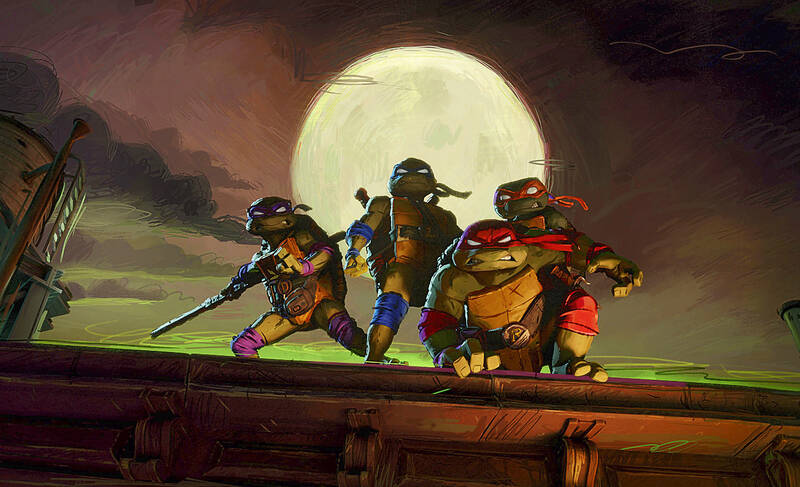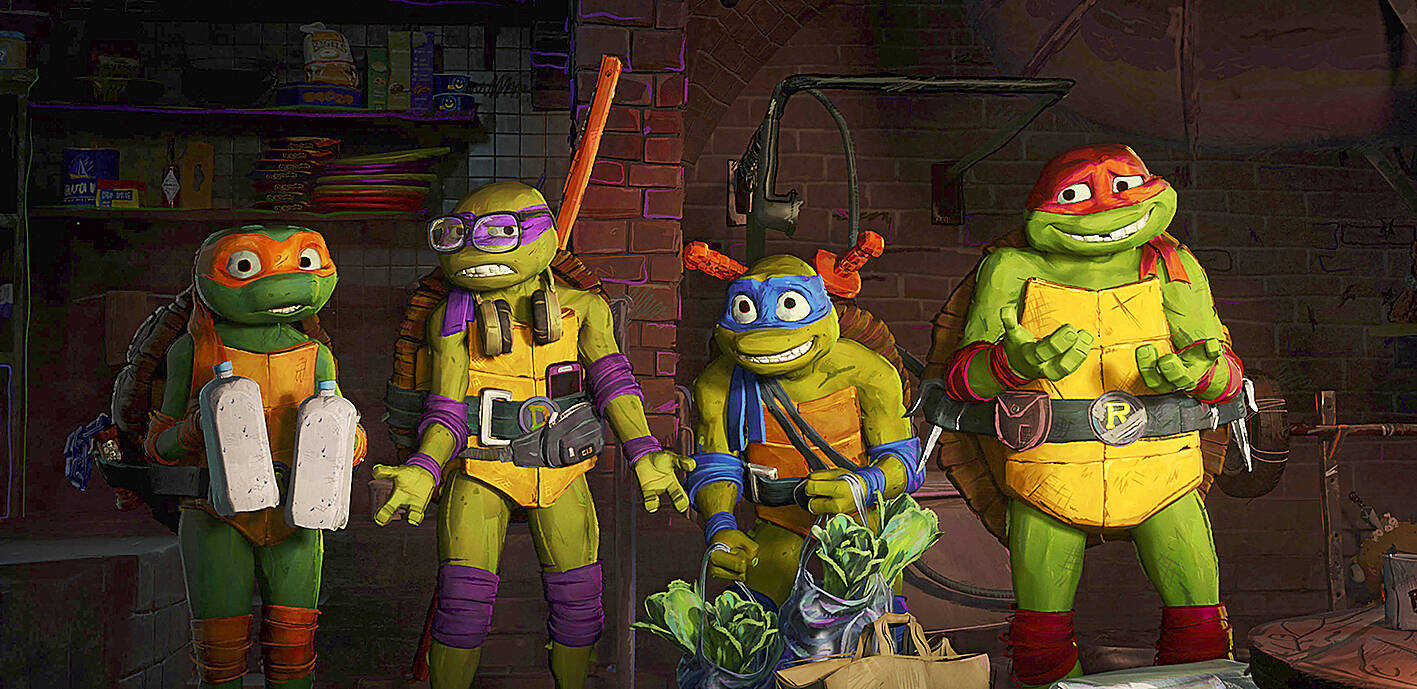There are some good gags and clever innovations in the animated Teenage Mutant Ninja Turtles: Mutant Mayhem, but there is one brilliant idea: casting Ice Cube as the voice of the movie’s mutant insect supervillain Super Fly.
It might have once been hard to foresee the value of having the emcee who rapped of “dropping bombs on your moms” as the MVP of a PG-rated kids movie. But we’re now up to the seventh Teenage Mutant Ninja Turtles film, not counting all the series and videogames. That’s a lot of movies for a bit of IP that’s clung more firmly to lunch boxes than it has to pop culture. For the turtles, it was getting to be time to either, as Ice Cube would say, “chickity-check yo’ self” or try something new.
Mutant Mayhem, currently in theaters throughout Taiwan, can’t entirely get over the feeling of trodding over well-covered turtle ground. But if we must go once more into the ooze, the film by director Jeff Rowe (co-director of The Mitchells vs the Machines) and co-written by co-producers Seth Rogen and Evan Goldberg, is probably the best of a not-so-stellar franchise. It’s certainly the one most invested with that “teenage” part of the turtles’ name. Plus, it’s got Ice Cube as a fly who quotes from the O’Jays.

Photo: AP
The animation is vividly textured, the beat is persistently hip-hop (Lauryn Hill, De La Soul, Ol’ Dirty Bastard and others pack the electronic score by Trent Reznor and Atticus Ross) and the New York of the film is impressively detailed. But the most important twist to this Teenage Mutant Ninja Turtles iteration may be diving into the teenage-ness of its 15-year-old turtles.
If Barbie was balanced between Greta Gerwig’s childhood memories and her adult feminism, Mutant Mayhem gives itself over more fully to the mindset of adolescence. That’s in the gross-out humor and the comic book-like feel of the animation. But these are also recognizable teenagers who watch movies (Ferris Bueller’s Day Off), pine for concert tickets and make goofy phone videos of themselves slicing watermelons.
What Donatello (Micah Abbey), Michelangelo (Shamon Brown Jr), Leonardo (Nicolas Cantu) and Raphael (Brady Noon) really want is to fit in and go to high school like other teens. They have been relegated to the sewer ever since Splinter, a rat voiced by Jackie Chan, happened upon them after they were exposed as hatchlings to the same ooze that spawned Super Fly — who himself was the product of experiments by scientist Baxter Stockman (Giancarlo Esposito, fated to dubious laboratories).

Photo: AP
Splinter has much the same opinion of the majority of the rats in Ratatouille: Humans can’t be trusted. (Splinter’s particular fear is that they will “milk” him.) So the turtles have grown up underground, a little like the homeschooled family of The Wolfpack, while yearning for the wider world.
They find a hint of it with a high-school journalist named April O’Neil (Ayo Edebiri), who wants to document, and thus prove to humankind, their decency. At the same, the turtles meet the charismatic Super Fly (voiced with bombastic aplomb by Ice Cube) and his band of mutants. At first, they’re fast-friends — “cousins,” Super Fly says — but the turtles then start hearing of Super Fly’s plans to turn all animals into mutants and eradicate the world of humans.
“Peoples, they got to go,” chimes one mutant.
Some of the thunder of Mutant Mayhem has been stolen by Into the Spider-Verse and this year’s Across the Spider-Verse — films that likewise upend the typical look of studio animation and do it with a pulsing soundtrack; but they did it more eclectically.
Yet this Teenage Mutant Ninja Turtles, while a half shell of those films, has its own low-key charms. It’s goofier, grosser and mostly fun. The four turtles are never more than a hard-to-differentiate bale of overlapping dialogue of doubt and anxiety. But that first word in their name finally feels genuine. Seven films in, it’s only right that Donatello, Michelangelo, Leonardo and Raphael should get a renaissance.

Dissident artist Ai Weiwei’s (艾未未) famous return to the People’s Republic of China (PRC) has been overshadowed by the astonishing news of the latest arrests of senior military figures for “corruption,” but it is an interesting piece of news in its own right, though more for what Ai does not understand than for what he does. Ai simply lacks the reflective understanding that the loneliness and isolation he imagines are “European” are simply the joys of life as an expat. That goes both ways: “I love Taiwan!” say many still wet-behind-the-ears expats here, not realizing what they love is being an

Every now and then, even hardcore hikers like to sleep in, leave the heavy gear at home and just enjoy a relaxed half-day stroll in the mountains: no cold, no steep uphills, no pressure to walk a certain distance in a day. In the winter, the mild climate and lower elevations of the forests in Taiwan’s far south offer a number of easy escapes like this. A prime example is the river above Mudan Reservoir (牡丹水庫): with shallow water, gentle current, abundant wildlife and a complete lack of tourists, this walk is accessible to nearly everyone but still feels quite remote.

It’s a bold filmmaking choice to have a countdown clock on the screen for most of your movie. In the best-case scenario for a movie like Mercy, in which a Los Angeles detective has to prove his innocence to an artificial intelligence judge within said time limit, it heightens the tension. Who hasn’t gotten sweaty palms in, say, a Mission: Impossible movie when the bomb is ticking down and Tom Cruise still hasn’t cleared the building? Why not just extend it for the duration? Perhaps in a better movie it might have worked. Sadly in Mercy, it’s an ever-present reminder of just

Google unveiled an artificial intelligence tool Wednesday that its scientists said would help unravel the mysteries of the human genome — and could one day lead to new treatments for diseases. The deep learning model AlphaGenome was hailed by outside researchers as a “breakthrough” that would let scientists study and even simulate the roots of difficult-to-treat genetic diseases. While the first complete map of the human genome in 2003 “gave us the book of life, reading it remained a challenge,” Pushmeet Kohli, vice president of research at Google DeepMind, told journalists. “We have the text,” he said, which is a sequence of